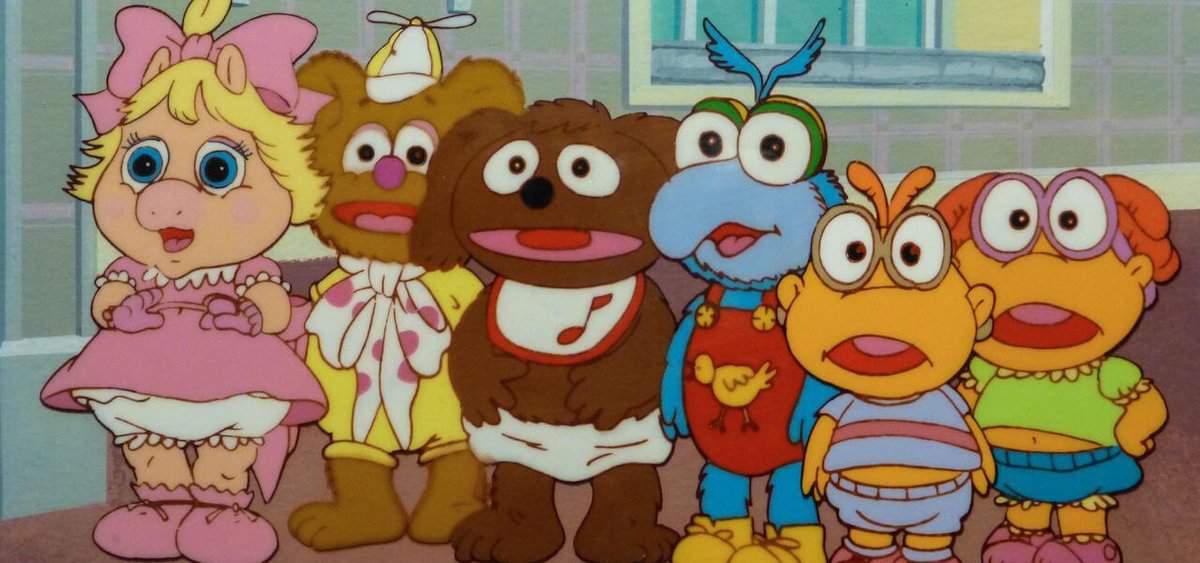“It’s time to play the music. It’s time to light the lights.” These opening lines from The Muppet Show have enchanted audiences for decades.
The Muppets, with their charming blend of humor and heart, have become a cultural icon since their inception by Jim Henson in 1955. The show’s unique blend of puppetry, live-action, and music quickly catapulted it to worldwide fame, making characters like Kermit the Frog, Miss Piggy, and Fozzie Bear household names.

Over the years, the Muppets have continued to capture the hearts of both young and old through various television shows, movies, and specials.
One of the most beloved spin-offs from the original series is Muppet Babies, which premiered in 1984. Inspired by a nursery dream sequence from The Muppets Take Manhattan (1984), the show features baby versions of the iconic Muppet characters.
Kermit, Miss Piggy, Fozzie, Gonzo, Animal, Rolf, Bunson, Beaker, and new character Skeeter, Scooter’s tomboy twin sister, embark on imaginative adventures from their nursery. Guided by their unseen caretaker, Nanny, the show combined classic 2D animation with live-action footage to bring their fantasies to life, becoming an instant hit among Saturday morning cartoons.
Despite its popularity and nostalgic value, the original Muppet Babies series has strangely vanished from streaming services and home media, leaving fans puzzled and frustrated.

According to a recent report by Giant Freakin Robot, Disney has been removing episodes of Muppet Babies from the internet, with no clear explanation provided. This removal has left a void for many fans who grew up watching the show and hoped to share it with newer generations.
The mystery behind the disappearance of Muppet Babies is compounded by conflicting accounts from those who worked on the show.
Guy Gilchrist, an animator for the series, explained at L.A. Comic Con that the legal complications surrounding the use of movie and TV clips in the show are a significant barrier. He mentioned that in the 1980s, securing rights for such clips was a more informal process, often relying on the goodwill of studios and creators. However, in today’s more litigious environment, securing these rights has become increasingly complicated.
On the other hand, Jeffrey Scott, the head writer for Muppet Babies, offered a different perspective in a 2018 interview for the book Totally Awesome: The Greatest Cartoons of the Eighties.
Scott asserted that if the legal rights were properly handled at the time, there should be no issues preventing the show from being available. He suggested that the rights for these clips were likely acquired in perpetuity, specifically to ensure the show could be distributed in the future.
Adding to the complexity, some theories suggest that the issue may lie in the archival storage of the original footage or the contracts being lost during the numerous mergers and acquisitions involving The Jim Henson Company, Marvel Productions, and Disney.

While Disney now owns the rights to Star Wars and Indiana Jones, which were frequently featured in the show, there are still other films and clips used in Muppet Babies whose rights are scattered across different studios, including Paramount and Universal.
To further complicate matters, Muppet Babies also used older movies, some of which are now in the public domain, while others still have divided rights among various entities. This patchwork of ownership makes it difficult to secure comprehensive rights for re-release, contributing to the show’s ongoing absence from streaming platforms and home media.
Despite these challenges, Disney launched a modern reboot of Muppet Babies in 2018. This new version, featuring 3D CGI animation, has been well-received by its target audience of young children, but it has left nostalgic-seeking adults disappointed.
However, for fans of the original series, the reboot lacks the charm and nostalgia that made the 1984 version so special. The continued absence of the original Muppet Babies remains a sore point for those who cherished its imaginative storytelling and unique animation style.

The enigmatic removal of Muppet Babies underscores a broader issue in the entertainment industry: the preservation and accessibility of classic media in the digital age. As streaming services become the primary means of consuming content, the fate of older shows and movies becomes increasingly uncertain. Without proper archival practices and legal foresight, many beloved series risk being lost to time, much like Muppet Babies.
For now, fans of the original Muppet Babies can only hope that the legal and logistical hurdles preventing its return will be resolved. Until then, the memories of those imaginative adventures in the nursery remain cherished in the hearts of those who grew up with Kermit, Miss Piggy, and the rest of the Muppet gang.
While you can see your favorite characters in Muppet Vision 3-D at Disney’s Hollywood Studios, there will be no sign of Muppet Babies for the foreseeable future.
